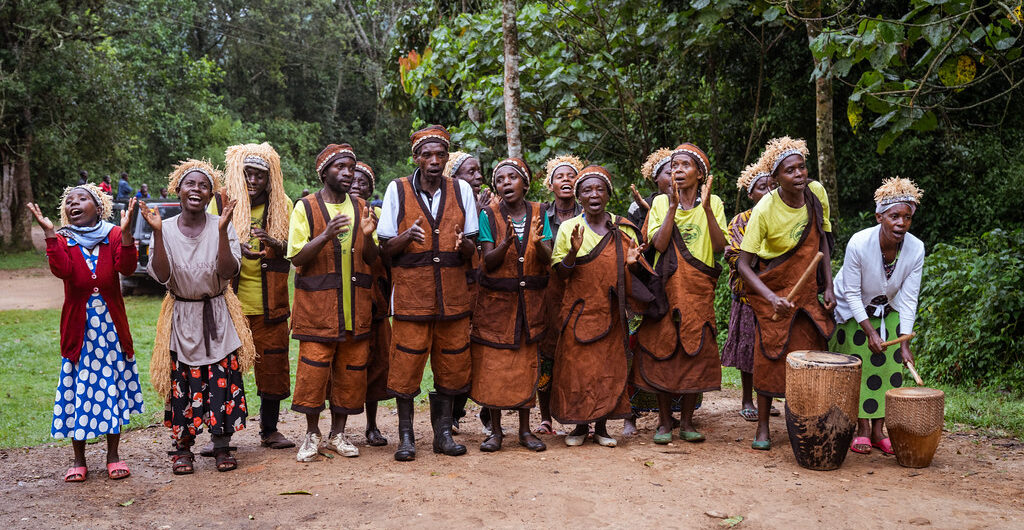The Batwa Cultural trail and experience in Uganda
The Batwa pygmies are believed to have been the first inhabitants of the East African great lakes regions. They migrated from the Ituri forests of Congo to the forest in South Western Uganda in search of wild fruits and bush meat. More so, Uganda’s part Batwa pygmies were carried out in Bwindi Impenetrable National Park and Mgahinga National Park in the early 1930’s. For thousands of years, they have lived peacefully in the dense forests found in these two parks and survived by hunting and gathering fruit. Colonial rule by the British marked the starting of the end for the Batwa reign in the forest.
Furthermore, the colonial rulers and later governments of Uganda regarded as the Batwa to be poachers and need to protect the forests in Bwindi. ‘’known as Echuya’’ and Mgahinga – more importantly the great endangered mountain Gorilla are inhabitant of Mgahinga. The first of the Batwa were forced to abandon their cultural heritage, customs and their way of life to live in selected camps and settlements outside the two national parks. Despite the efforts by the government and many international and local organizations to help ensure a smooth transition to their new settlements.
More so, the Batwa people have never adapted 100% to their new way of life and settlements. Due to new life they entered into, they have faced new diseases, drunkenness and chronic poverty which they had never experienced in their first way of life. While in the forest, they were way specialized in hunting, harvest honey or gather fruits. Today, they engage more in bee keeping and other farming methods which they find difficult considering methods still used.
They have survived on plant as their own fruit, vegetables, beans and potatoes. Some have resorted to burning trees for firewood and charcoal. Visiting the Batwa people, expect to see men and women carrying heavy loads of merchandise to the market places for sale. Although, they have faced social challenges. Facts about Batwa Pygmies; Today, they have learnt to live with neighboring local Bantu tribes whom they had avoided for years. Sadly, they face discrimination and stigmatization from their Bantu neighbors because of their different way of life. Their identity as true citizens of the country is debatable given their relative poverty and general failure to integrate respectively.
Due to these challenges, some of them still poach animal like antelopes in the national park whereas other live as beggars. Note; Many still dream of getting back to their former comfort zone in the forest. The comfort zones they used to live in harmony with endangered mountain gorillas. The Batwa Cultural Trail and Experience in Uganda Batwa Trail Experience Organizations and Agencies supporting the Batwa people; The extreme poverty, hunger and particularly high mortality had reduced the number of the of the Batwa to about 3,000 people caught the attention of several international and local organizations. ’’Dr. Scot Kellerman and Coral Kellerman’’ were the first foreign visitors to start projects on water, sanitation and the promotion of the rights of the Batwa people.
The Kellerman family settled around the Batwa and founded the Kellerman foundation which works together with the Batwa people and Batwa Development Program deals in building clinics, hospitals, schools and other community development activities aimed at improving the condition of the Batwa. In 2002, another organization came up ‘’ UOBDU’’ the United Organization for Batwa Development was founded to support activities that help in income generation, land, housing, forest access benefit sharing adult literacy and education.
Well, Batwa trail in Mgahinga Gorilla National Park and the Batwa cultural visit in Bwindi have contributed to the social and economic welfare of the Batwa community by tapping into the generous proceeds from Tourism. Apparently, some are considered as Tour guides in these national parks. But during the Batwa trail in Mgahinga, they feel like the forest still belongs to them. More to that, the money they get from the tourists helps supplement their incomes thus improving the incomes of their families. While visiting the Batwa in Bwindi and Mgahinga, number of tourists have been touched by their situation they under go through and offer generous donations which come in form of money, clothing and storytelling.
These are further attracted funding to projects geared towards improving the conditions of this beautiful community. Cost of the Batwa Trail’ Batwa trail experience in Mgahinga Gorilla National Park costs USD80 per person for foreign nonresident and USD70 per person for foreign resident. For wanting to produce a documentary requires you an additional fees USD400. What to carry with you;
While planning to go for the Batwa cultural experience, you need to consider right gears to carry such as; garden gloves, long sleeve shirts and trousers to help protect you from the rains, thorns and sharp forest trees. You should also carry along other essential items like a camera and insect repellents among others. Lastly, visitors can combine gorilla trekking with a visit to Batwa community or undertaken in wildlife safari –Game drive in Queen Elizabeth, Murchison Falls and Kibale National Park for Chimpanzee trekking or habituation experience.
Just Get Started Now!

